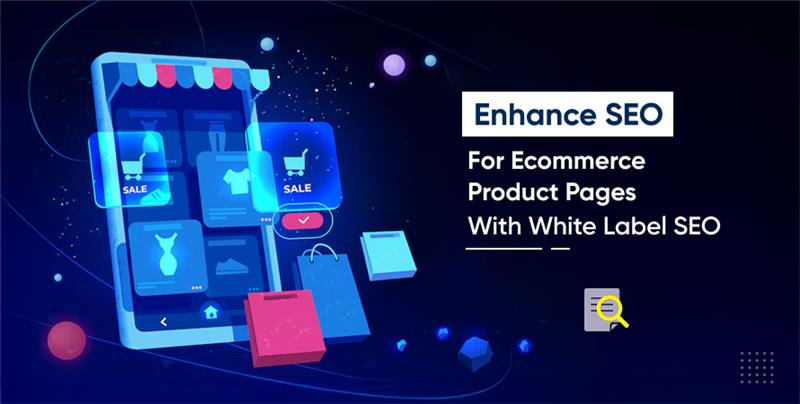Enhance SEO for Ecommerce Product Pages With White Label SEO



Introduction
In today’s hyper-competitive online landscape, having an ecommerce store is no longer enough. To drive consistent, high-quality traffic and convert visitors into buyers, ecommerce businesses must pay close attention to their search engine visibility. At the heart of this visibility lies one critical component: product page SEO.
Product pages are not just digital shelves—they are decision-making hubs. When optimized correctly, they not only rank higher on search engines but also improve user experience and drive conversions. However, many online retailers overlook these pages, leaving them with duplicate content, missing keywords, and poor mobile usability.
This comprehensive guide will show you how to enhance Search Engine Optimization for ecommerce product pages using proven strategies and best practices. We’ll also explore how partnering with a white label SEO company can help scale your efforts effectively and efficiently, especially if you manage multiple ecommerce clients or stores.
Let’s dive into how to build ecommerce SEO strategies that are not just technically sound but rooted in Google’s E-E-A-T principles: Experience, Expertise, Authoritativeness, and Trustworthiness.
Understanding E-commerce SEO: Why Product Pages Matter
Ecommerce SEO refers to the process of making your online store more visible in search engine results pages (SERPs). Unlike general SEO, ecommerce SEO focuses specifically on product and category pages, with the goal of attracting users who are ready to buy.
Product pages are arguably the most important part of your store’s SEO strategy. These are the pages that display your inventory, persuade customers, and ultimately convert traffic into revenue. Yet, many ecommerce businesses fail to optimize them effectively.
Common pitfalls include:
- Using manufacturer-supplied descriptions that create duplicate content issues.
- Ignoring keyword research or user intent.
- Forgetting to optimize product images and alt tags.
- Failing to structure content in a way that is useful to both users and search engines.
Proper ecommerce SEO ensures that your product pages appear when potential customers search for relevant keywords. This visibility increases your chances of clicks, engagement, and ultimately, conversions.
The Pillars of High-Converting Ecommerce SEO Strategy
Developing a successful ecommerce SEO strategy requires a solid foundation built on several core pillars. Each one contributes to how well your product pages perform in organic search.
Technical SEO
Technical SEO refers to the backend optimizations that ensure your website is crawlable, indexable, and fast. Key elements include:
- Fast page load speeds, particularly on mobile.
- Secure (HTTPS) protocols.
- Proper use of canonical tags to prevent duplicate content.
- XML sitemaps that help search engines find and index your pages.
- Structured data to enhance rich results.
Google prioritizes user experience, and many technical issues directly impact how your users interact with your site.
On-Page SEO
On-page SEO for ecommerce sites include the visible content and behind-the-scenes elements of your product pages. Make sure to:
- Use unique, keyword-optimized product titles (H1 tags).
- Write compelling meta descriptions that improve click-through rates.
- Optimize URL slugs for clarity and keyword relevance.
- Use header tags (H2, H3) to structure information.
User Experience (UX)
Ecommerce SEO and user experience go hand in hand. A confusing or frustrating layout will increase bounce rates and decrease conversions.
Best practices include:
- Clear product images and videos.
- Prominent “Add to Cart” buttons.
- Mobile-responsive design.
- Logical navigation and breadcrumb trails.
Content Strategy
Good content not only informs but sells. E-commerce product (SEO) pages should feature:
- Unique and persuasive product descriptions.
- Feature-benefit breakdowns.
- Customer reviews and ratings.
- Detailed FAQs related to the product.
By aligning with E-E-A-T principles, your content can demonstrate experience and authority while building trust.
Product Page Optimization Tactics to Boost Website SEO
Now that we’ve covered the foundation, let’s explore specific optimization techniques that can dramatically boost SEO on product pages.
Write Unique Product Descriptions
Avoid duplicating content from manufacturers or competitors. Instead, craft descriptions that speak directly to your audience using natural, relevant keywords. Include semantic variations of your target keywords to enhance context and relevance.
Use Structured Data and Schema Markup
Schema markup helps search engines better understand your product pages. Implementing schema.org tags like Product, Offer, Review, and AggregateRating can lead to rich snippets, which increase click-through rates.
Optimize Product Images
Images are central to ecommerce, but they also impact SEO. Make sure to:
- Compress image files without sacrificing quality.
- Use descriptive, keyword-rich file names.
- Include alt text that describes the image accurately.
- This improves both accessibility and image search visibility.
Leverage Customer Reviews
Search engines value fresh, user-generated content. Enabling product reviews not only adds credibility but also introduces long-tail keywords that customers naturally use.
Internal Linking
Link related products, categories, or buying guides within product pages. This distributes link equity and keeps users engaged, which can positively affect bounce rates and time on site.
Advanced Ecommerce SEO Best Practices
For ecommerce sites competing in saturated markets, basic SEO alone may not be enough. These advanced tactics can provide a crucial edge.
Implement Canonical Tags Strategically
If your site has variations of the same product (e.g., different colors or sizes), use canonical tags to signal the primary version to Google and avoid duplicate content penalties.
Use Semantic SEO
Incorporate Natural Language Processing (NLP) by using keyword clusters instead of repeating a single phrase. For instance, instead of focusing only on “running shoes,” include phrases like “best athletic sneakers” or “trail shoes for men.”
Create Bundled or Collection Pages
“Shop the look” pages or curated product collections help target broader transactional queries. These pages also support internal linking and can rank for higher-volume search terms.
Use Topic Clusters
Develop content clusters around product categories. For example, if you sell outdoor gear, you can link your product pages to blog posts like “Top 10 Hiking Essentials” or “How to Choose a Backpack for Camping.”
A/B Test SEO Elements
Test variations of product titles, meta descriptions, and images to identify what drives better CTR and engagement. Use tools like Adobe Target or VWO for split testing.
Leveraging a White Label SEO Company for Ecommerce Success
Managing SEO across a large ecommerce store—or multiple client stores—can be resource-intensive. That’s where partnering with a white label SEO company comes in.
What Is a White Label SEO Provider?
A white label SEO provider offers SEO services that you can resell under your brand. This model allows digital agencies and ecommerce consultants to scale their offerings without hiring in-house SEO specialists.
Benefits of White Label SEO Services for Ecommerce
- Scalability: Whether you manage one store or fifty, you can deliver consistent results.
- Expertise: Tap into experienced SEO professionals who stay updated on Google’s latest algorithm changes.
- Efficiency: Delegating audits, keyword research, content creation, and reporting frees up your team’s time.
- Cost Savings: No need to invest in expensive SEO tools or hire a full-time team.
Services Offered by White Label SEO Providers
Reputable white label SEO companies typically provide:
- Comprehensive site and product page audits
- Keyword research tailored to ecommerce queries
- On-page optimization including titles, descriptions, and schema
- Technical SEO fixes (site speed, mobile responsiveness)
- Link building to boost domain authority
- Reporting and analytics dashboards
Choosing the Right Partner
Look for white label SEO providers that:
- Specialize in ecommerce Search Engine Optimization (SEO)
- Offer transparent processes and white-glove support
- Provide clear reporting that you can brand
- Stay compliant with Google’s best practices
A strategic partnership can significantly improve your ability to increase SEO rankings across product pages and scale growth.
Common Mistakes That Hurt SEO for Ecommerce Sites
Even well-intentioned businesses make mistakes that can hurt their search rankings. Avoid these common pitfalls:
Duplicate Product Descriptions
Relying on manufacturer-provided product descriptions results in duplicate content across multiple ecommerce sites. This makes it harder for search engines to differentiate your pages, often leading to lower rankings and reduced visibility in competitive search results.
Keyword Stuffing
Overloading product pages with excessive keywords disrupts content flow and diminishes readability. Search engines now prioritize user intent and natural language, so stuffing keywords can lead to penalties, lower rankings, and a poor user experience.
Ignoring Mobile Optimization
With the majority of ecommerce traffic coming from mobile devices, an unresponsive or slow-loading mobile experience significantly increases bounce rates. Google uses mobile-first indexing, meaning poor mobile performance can directly harm your organic search visibility.
Lack of Structured Data
Without structured data markup like schema.org tags, your product pages miss opportunities for rich snippets in search results. This reduces click-through rates and makes your listings less informative and competitive compared to optimized competitors.
Neglecting Image Optimization
Large image files and missing alt text slow down load times and hurt accessibility. Optimizing images with compression and descriptive alt tags enhances both SEO and user experience, especially for visually-driven product categories.
Addressing these issues early can lead to quicker wins and long-term SEO benefits.
Measuring Ecommerce SEO Success: Metrics to Track
Tracking the right metrics ensures your ecommerce SEO strategy is working. Key performance indicators (KPIs) to monitor include:
- Organic Traffic: Volume and quality of visitors coming from search engines.
- Conversion Rates: Percentage of visitors who complete a purchase.
- CTR (Click-Through Rate): From impressions to clicks in search results.
- Bounce Rate: How many users leave without interacting.
- Revenue from Organic Search: Your ultimate bottom-line measure.
Use Google Search Console, Google Analytics, and ecommerce platforms like Shopify or WooCommerce for accurate tracking.
Conclusion
Enhancing SEO for ecommerce websites is a long-term investment that delivers measurable returns. From optimizing product descriptions and images to implementing structured data and improving site speed, the tactics outlined in this guide are designed to build a strong foundation rooted in Google’s E-E-A-T principles.
But executing these strategies at scale requires time, expertise, and consistency. That’s where working with a white label SEO company can offer tremendous value. Whether you run an ecommerce brand or manage multiple client websites, outsourcing to a trusted white label SEO provider ensures your SEO is handled by specialists who understand the intricacies of ecommerce.
If you’re looking for reliable, scalable support to grow your online presence, consider partnering with White Label SEO Providers—your behind-the-scenes experts in delivering real ecommerce SEO results.
Frequently Asked Questions (FAQs)
Ecommerce SEO is the process of optimizing your online store to rank higher in search engine results. Product pages are essential because they directly influence conversions and revenue. Well-optimized product pages help you attract qualified traffic and improve your visibility for transactional search queries.
To increase SEO rankings, focus on writing unique product descriptions, optimizing for mobile, using structured data, and improving page load speed. Use relevant keywords naturally, add customer reviews, and build internal links to related products or content.
A strong ecommerce SEO strategy combines technical SEO, high-quality content, keyword targeting, user experience design, and ongoing performance tracking. It also involves understanding buyer intent and creating content clusters around product themes.
Yes. A white label SEO company can offer expert-level optimization services that you can brand as your own. They help with audits, keyword research, on-page optimization, content creation, and performance tracking—making it easy to scale ecommerce SEO efforts.
Look for a provider with a proven track record, expertise in ecommerce SEO, transparent pricing, white-label reporting, and adherence to ethical SEO practices. Ensure they offer scalable services that align with your business goals.